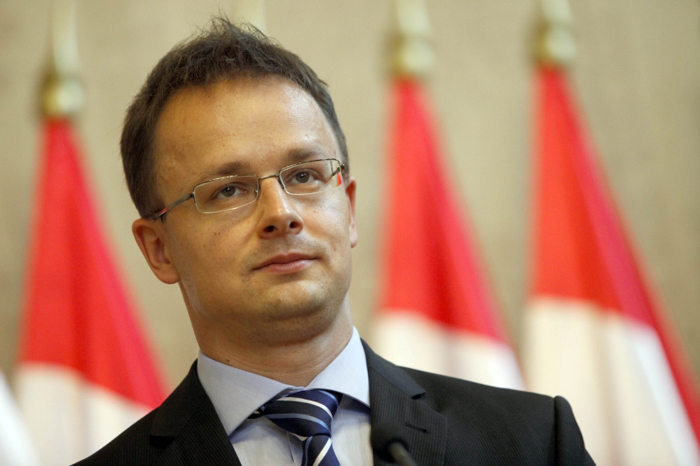Hungary looking for new capacities in Azerbaijan

By Nigar Orujova
Hungary is highly interested in the development of bilateral relations with Azerbaijan, Hungarian Minister of Foreign Affairs and Trade Peter Szijjarto said on the eve of his Baku visit.
During the visit scheduled for November 3-4, Szijjarto will hold talks with Azerbaijan's foreign minister, minister of economy and industry, minister of agriculture, minister of culture and tourism and head of Azerbaijan's state oil fund.
"Azerbaijan is a key strategic member of the Eastern Opening Policy. The main aim of my visit to Baku is to further develop our fruitful economic cooperation and enhance our cooperation in other relevant fields as well," the minister told Trend.
He added that Hungary also aims to discover new capacities and areas to deepen the relations with Azerbaijan in a mutually beneficial way.
Hungary and Azerbaijan could be long-term strategic partners, Szijjarto noted.
"Our economic, trade and investment relations are dynamically developing. This is reflected in the high-level visits which are organized more frequently between two sides," the minister said.
Szijjarto said contractual relationship between Azerbaijan and Hungary is well established, but there are always some capacities to widen the scope of different areas to be covered by agreements.
"As I mentioned before, the establishment of strategic cooperation between our countries is an important goal; any agreement that can widen the scope of the legal framework of the bilateral cooperation is welcomed by our side," he added.
Speaking about the measures to increase the trade turnover between the two countries, he said Hungary would like to achieve greater access to all markets, especially in the target countries of the Eastern Opening strategy.
"In Azerbaijan, we are following the issue through our embassy in Baku, the Joint Economic Committee and the Hungarian Trade House. The direct flight between our capitals which began in June 2011 contributes to this cause," Szijjarto added.
The minister emphasized that Hungary, as a member state of the European Union, views Azerbaijan as an important partner not just on a regional but also on continental level.
"This approach is reflected in the Hungarian position when it comes to discussing the EU's relations with Azerbaijan in different EU forums as well," he said.
"The cooperation in the framework of the Eastern Partnership is an important one; in this regard, Hungary is a supporter of the notion of differentiation between different partner countries," Szijjarto added.
Hungary interests in AGRI
He also noted that Hungary is interested in the success of the AGRI (Azerbaijan-Georgia-Romania Interconnector) project, which would diversify the sources and routes of natural gas supplies.
The members of the AGRI project are the State Oil Company of Azerbaijan (SOCAR), Georgia's Oil and Gas Corporation, as well as MVM (Hungary) and Romgaz (Romania) companies.
Szijjarto said Hungary is involved in the AGRI project on
governmental and corporate level as well.
"The MVM Hungarian Electricity Ltd. joined the AGRI project company
in March 2011," he added.
He said Hungary, like other members of the project, is waiting for
the finalization of the feasibility study. "Let me not speculate on
the eventual outcome of the study, but I am to emphasize that
Hungary is interested in the success of the project, which would
diversify our sources and routes of natural gas supplies."
The AGRI project is currently developing. The economically place
of the construction of the terminal for liquefied natural gas on
the Black Sea coast of Georgia will be determined after developing
the feasibility study.
The volume of investments needed for implementing the planned work
on Georgia's territory will be defined based on this document.
The project's feasibility study is being developed by UK's Penspen
Company which was chosen via a tender.
Three options are considered regarding the capacity of the AGRI
project: 2 billion cubic meters of gas per year, 5 billion cubic
meters and 8 billion cubic meters. The cost of the project will
vary from 1.2 billion euros to 4.5 billion euros depending on these
options.
Hungary supports Azerbaijan's territorial integrity
Szijjarto also pointed out that Hungary's principles remain unchanged: the sovereignty and territorial integrity of Azerbaijan should be guaranteed.
The minister said it is also crucial to guarantee the protection of rights of national minorities and ethnic groups.
Answering a question about Hungary's position towards continued violation of rights of the Azerbaijani refugees and IDPs as a result of occupation of the Azerbaijani territories, Szijjarto said Hungary supports the efforts of the OSCE Minsk Group
"All conflicts have to be solved through negotiations," he added.
The Nagorno-Karabakh conflict emerged in 1988 when Armenia made territorial claims against Azerbaijan. Since a lengthy war in the early 1990s that displaced over one million Azerbaijanis, Armenian armed forces have occupied over 20 percent of Azerbaijan's internationally recognized territory, including Nagorno-Karabakh and seven adjacent regions. The UN Security Council's four resolutions on Armenian withdrawal have not been enforced to this day.
Peace talks, mediated by Russia, France and the U.S. through the OSCE Minsk Group, are underway on the basis of a peace outline proposed by the Minsk Group co-chairs and dubbed the Madrid Principles. The negotiations have been largely fruitless so far.
Here we are to serve you with news right now. It does not cost much, but worth your attention.
Choose to support open, independent, quality journalism and subscribe on a monthly basis.
By subscribing to our online newspaper, you can have full digital access to all news, analysis, and much more.
You can also follow AzerNEWS on Twitter @AzerNewsAz or Facebook @AzerNewsNewspaper
Thank you!
